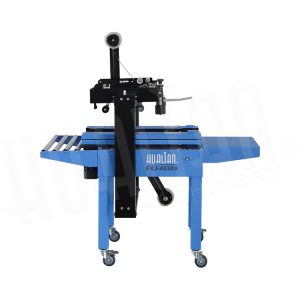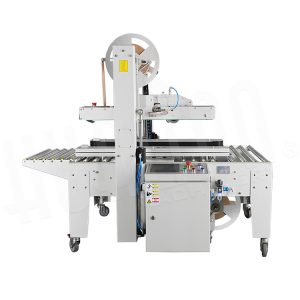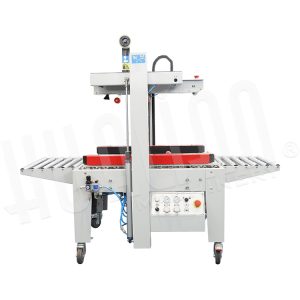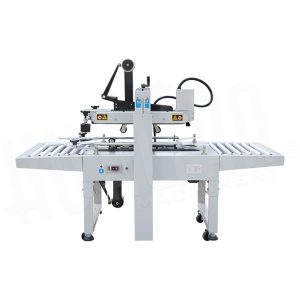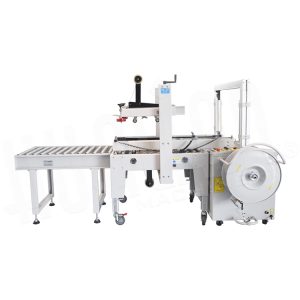In today’s fast-paced logistics and manufacturing industries, efficiency and consistency in packaging are crucial. A carton sealing machine plays a vital role in securing products for storage or transport, helping businesses maintain productivity, protect products, and meet customer expectations.
Among the many types of carton sealers available, semi-automatic and automatic carton sealers are the most widely used. Both offer advantages depending on production scale, labor resources, and packaging needs. Understanding the differences between these two machines is essential for choosing the right equipment for your facility.
Learn More: Top 7 Reasons to Use a Box Sealing Machine
What Are the Differences Between Semi-Automatic and Automatic Carton Sealers?
Choosing between a semi-automatic carton sealer and an automatic carton sealer requires a clear understanding of their key differences across several functional areas.
| Feature | Semi-Automatic Carton Sealer | Automatic Carton Sealer |
|---|---|---|
| Operation Method | Manual box feeding | Fully automatic box detection and sealing |
| Production Speed | Moderate, depends on operator | High, continuous operation |
| Flexibility | Manual adjustment for box sizes | Auto-adjusts to various box sizes (e.g., random carton sealer) |
| Cost | Lower initial investment | Higher initial investment, better long-term ROI |
| Space Requirement | Compact, ideal for small spaces | Larger, needs more space for conveyors |
| Best For | Small businesses, low-volume packaging | Large operations, high-volume production |
Operation Method
A semi-automatic carton sealer requires an operator to manually fold the carton flaps and feed the box into the machine. The machine automatically applies tape to the top and/or bottom once the carton enters the sealing area, but human intervention is necessary for the initial setup. This makes semi-automatic sealers ideal for packaging lines where some manual handling is acceptable.
In contrast, an automatic carton sealer minimizes human involvement. These machines automatically detect the carton, fold the flaps, position the box correctly, and apply the tape without operator assistance. This full automation significantly reduces labor and maximizes consistency, making them suitable for high-speed production environments.
Production Speed and Efficiency
Production speed is one of the most noticeable differences between the two machine types. Semi-automatic sealers depend partly on operator efficiency, making them suitable for moderate production volumes. They offer consistent sealing but may not be able to keep up with continuous, high-speed output.
Automatic carton sealers deliver much higher throughput because they eliminate manual carton handling. They can operate continuously and maintain steady sealing speeds regardless of operator skill or fatigue. For businesses with large order volumes, an automatic system dramatically increases efficiency and reduces bottlenecks.
Adaptability and Flexibility
Semi-automatic models are generally easy to adjust, making them suitable for businesses that handle a variety of carton sizes. Operators can quickly modify the machine settings when switching between different products. This flexibility makes semi-automatic sealers an excellent choice for small to medium-sized production lines with frequent size changes.
Automatic carton sealers come in both fixed-size and random-size versions. Random automatic machines automatically detect the height and width of each carton, making them ideal for packaging lines that process mixed-size boxes. While automatic machines offer superior adaptability, their advanced features may not be necessary for businesses with low or predictable packaging variations.
Cost and Investment
A key factor in choosing between semi-automatic and automatic carton sealers is the required investment. Semi-automatic sealers are more affordable and offer excellent value for businesses transitioning from manual sealing. They reduce labor requirements while keeping equipment costs relatively low.
Automatic carton sealers require a higher upfront investment because of their sophisticated automation capabilities and advanced components. However, their long-term cost efficiency is often greater due to significant labor savings, increased speed, and improved sealing consistency. For high-volume operations, the return on investment is typically quicker with an automatic machine.
Space Requirements and Layout
Semi-automatic carton sealers are compact and require minimal space, making them ideal for smaller workshops or packaging stations with limited area. Their simple design allows for easy integration into existing workflows without major layout changes.
Automatic carton sealers often require more space because they include additional components such as flap-folding mechanisms, conveyors, sensors, or integration modules. When installing an automatic system, businesses must consider workflow design, conveyor length, and material handling requirements. Despite the larger footprint, the efficiency gains often justify the added space.
Suitable Application Scenarios
Semi-automatic carton sealers are ideal for businesses with small to medium production volumes, frequent size changes, or budget constraints. They are also suitable for operations where manual labor is still incorporated into other packaging tasks.
Automatic carton sealers excel in high-volume production lines, fulfillment centers, and industrial environments where speed, consistency, and labor reduction are top priorities. They are also the best choice for businesses seeking long-term automation, tight quality control, and minimal operator involvement.
To explore high-performance semi-automatic and automatic systems, Hualian offers a full range of solutions at here.
4 Key Considerations When Choosing a Carton Sealer
Selecting between a semi-automatic and an automatic carton sealer depends on your operational goals. Here are four critical factors to consider:
| Consideration | Semi-Automatic Carton Sealer | Automatic Carton Sealer |
|---|---|---|
| Equipment Footprint | Compact, good for limited space | Larger, suited for big production areas |
| Number of Employees | Needs at least one operator per unit | Minimal labor needed |
| Production Needs | Best for low to medium volumes | Ideal for high-volume, fast-paced lines |
| Overall Cost | Lower upfront cost, higher ongoing labor cost | Higher upfront cost, better long-term value |
Equipment Footprint
Evaluate your available workspace. If floor space is limited, a compact semi-automatic carton sealer may be the better option. For high-volume operations with designated packing areas, an automatic carton sealer fits seamlessly into large production lines.
Number of Employees
A semi-automatic machine requires at least one operator per unit. If labor is limited or expensive, investing in automation can reduce headcount and repetitive strain injuries, making an automatic carton sealing machine a safer and more efficient solution.
Production Needs and Budget
Consider your daily sealing volume and forecasted growth. For businesses handling hundreds or thousands of boxes daily, the speed and reliability of an automatic carton sealer provide significant time and cost advantages. For lower volumes, a semi-automatic unit might suffice.
Overall Cost
Think beyond the upfront cost. Factor in labor expenses, downtime, maintenance, and tape usage. While automatic machines are more expensive initially, they often deliver better long-term value in high-demand settings.
Boost Packaging Speed with Our Semi-Auto Case Sealer Today
Conclusion
Both semi-automatic and automatic carton sealers are essential tools in the modern packaging process. Your choice depends on the size of your operation, available space, labor availability, and budget. Understanding the core differences between these machines helps you make an informed investment that supports your business growth and efficiency.
Whether you’re upgrading your packaging line or launching a new one, choosing the right carton sealing machine can lead to smoother operations, lower costs, and greater customer satisfaction. For businesses seeking reliable, high-performance packaging solutions, Hualian offers a comprehensive range of semi-automatic and automatic carton sealers built for durability, stability, and long-term value. Contact Us to explore our full catalog today!











